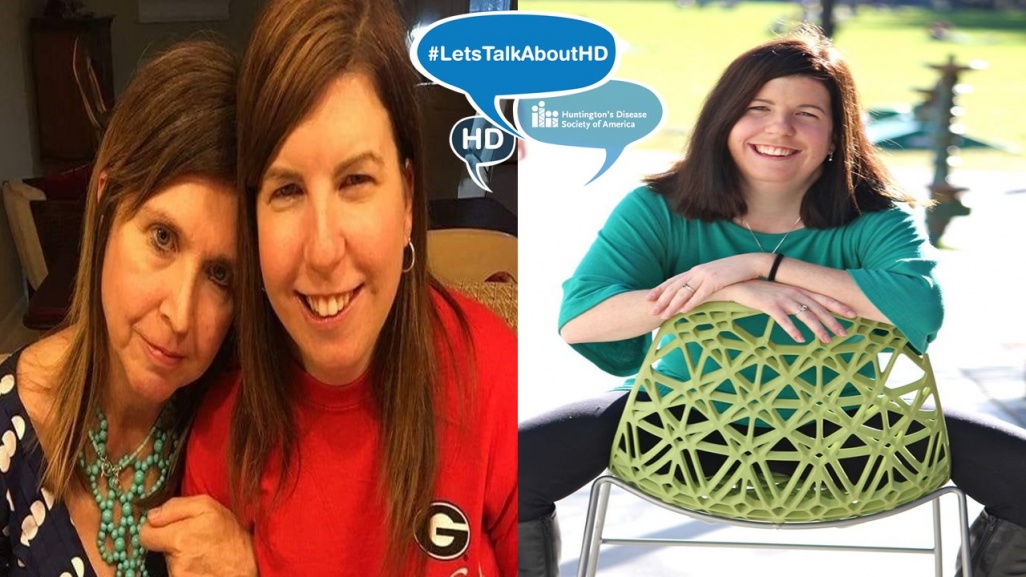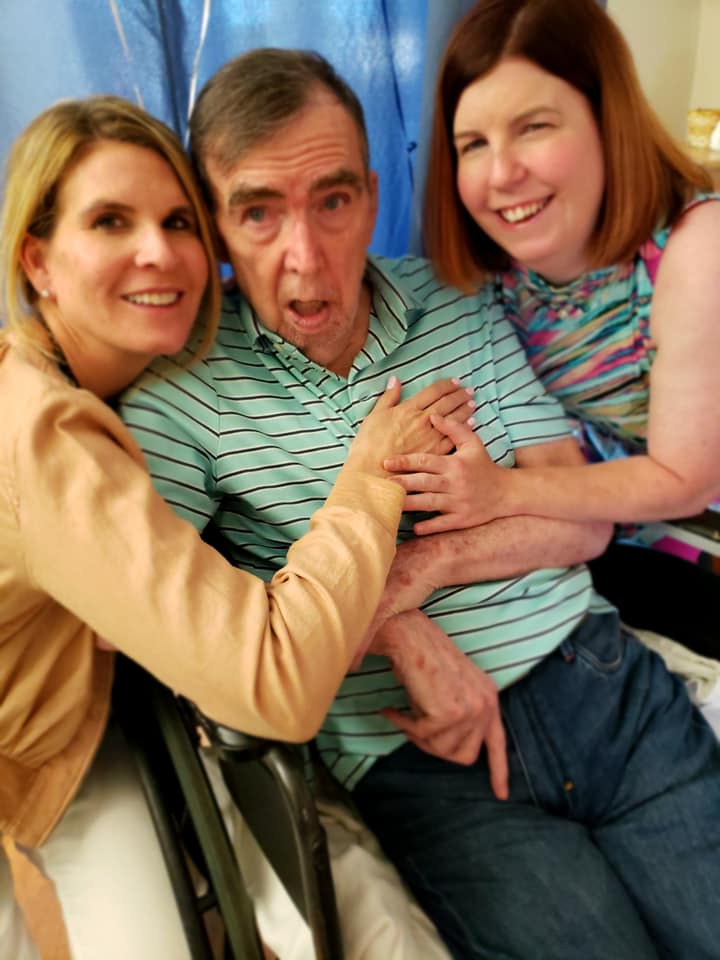
By Matthew Santamaria (msantamaria@hdsa.org)
In 2010, Sarah Warehime was on her way to bible study. She received a phone call that rocked her world. Her father tested positive for the gene that causes Huntington’s disease (HD).
HD is a fatal genetic disorder that causes the progressive breakdown of nerve cells in the brain. It deteriorates a person’s physical and mental abilities usually during their prime working years and has no cure.
This put Sarah and her two sisters (Kelly and Jennifer) at risk for HD. Every child of a parent with HD has a 50/50 chance of inheriting the faulty gene that causes HD. Kelly and Jennifer were from their father's first marriage.
When Sarah was younger, her father was misdiagnosed as bipolar and schizophrenia. Her father was also abused as a child by his own father. He had trouble keeping a job and became depressed. Her mother then decided to move on from her father because she wanted to provide structure. Sarah was not in her father’s life for more than seven years. According to Sarah, the disease caused many heartaches and divorce.

HD is described as having ALS, Parkinson’s and Alzheimer’s diseases – simultaneously. Symptoms include personality changes, mood swings, depression, forgetfulness, impaired judgement, unsteady gait, involuntary movements, slurred speech, difficulty in swallowing, and significant weight loss.
Kelly and Jennifer are nurses. According to Sarah, the disease was still difficult for them to comprehend. As time passed, they would both be tested for HD.
The decision to get genetically tested is difficult to make. Each year, 5-10% are tested. It is never the right or wrong decision to be tested. There are people that see no benefit in knowing that they will develop the disease while others want to know in order to make informed choices about their future. It can take up to several weeks to receive your results from the genetic testing center.
Jennifer would test negative for HD. Kelly tested positive for HD. This year, Sarah has decided to get tested for HD at Emory University in Georgia. On July 7th, Sarah tested positive for HD.
This is one of the 50 HDSA Centers of Excellence that provide an elite team approach to HD care and research. Professionals have extensive experience working with families affected by HD and work together to provide families the best HD care program.
Five years ago, her father was placed in assisted living for the first time. He was abused and it took awhile for him to get adjusted to assisted living. Sarah’s father is now in a nursing home in Kentucky, but it was a journey to secure him the right place to live. Each week, his first week brings him a meal and assists in feeding him. According to Sarah, they act like they are still in love and she taught her forgiveness.
"She has a heart of gold and not many first wife's take care of their an ex husband," Sarah explains.
Sarah plans on getting involved in the HD Community because God has a plan for her and she wants to show others that nobody is alone in this battle.

Sarah has a message for the HD Community:
“Be thankful for what you have now and don’t take things for granted in life. Take as many pictures as you can. Take things one day at a time. God has a plan and we will get through this together.
###
Huntington’s disease is a fatal genetic disorder that causes the progressive breakdown of nerve cells in the brain. It deteriorates a person’s physical and mental abilities usually during their prime working years and has no cure. Every child of a parent with HD has a 50/50 chance of inheriting the faulty gene that causes Huntington’s disease. Today, there are approximately 41,000 symptomatic Americans and 200,000 at-risk of inheriting the disease. In less than 10% of cases, juvenile Huntington’s disease (JHD) affects children & adolescents. JHD usually has a more rapid progression rate than adult onset HD; the earlier the onset, the faster JHD progresses. HD is described as having ALS, Parkinson’s and Alzheimer’s diseases – simultaneously. HD is characterized by a triad of symptoms, including progressive motor dysfunction, behavioral disturbance and cognitive decline.
The Huntington’s Disease Society of America is the premier nonprofit organization dedicated to improving the lives of everyone affected by HD. From community services and education to advocacy and research, HDSA is the world’s leader in providing help for today and hope for tomorrow for people with HD and their families.
To learn more about Huntington’s disease and the work of the Huntington’s Disease Society of America, visit www.HDSA.org or call 1(800)345-HDSA.
This is a story featuring a personal experience with Huntington’s disease. If you would like to have your story told please contact Matthew Santamaria at msantamaria@hdsa.org
In 2010, Sarah Warehime was on her way to bible study. She received a phone call that rocked her world. Her father tested positive for the gene that causes Huntington’s disease (HD).
HD is a fatal genetic disorder that causes the progressive breakdown of nerve cells in the brain. It deteriorates a person’s physical and mental abilities usually during their prime working years and has no cure.
This put Sarah and her two sisters (Kelly and Jennifer) at risk for HD. Every child of a parent with HD has a 50/50 chance of inheriting the faulty gene that causes HD. Kelly and Jennifer were from their father's first marriage.
When Sarah was younger, her father was misdiagnosed as bipolar and schizophrenia. Her father was also abused as a child by his own father. He had trouble keeping a job and became depressed. Her mother then decided to move on from her father because she wanted to provide structure. Sarah was not in her father’s life for more than seven years. According to Sarah, the disease caused many heartaches and divorce.

HD is described as having ALS, Parkinson’s and Alzheimer’s diseases – simultaneously. Symptoms include personality changes, mood swings, depression, forgetfulness, impaired judgement, unsteady gait, involuntary movements, slurred speech, difficulty in swallowing, and significant weight loss.
Kelly and Jennifer are nurses. According to Sarah, the disease was still difficult for them to comprehend. As time passed, they would both be tested for HD.
The decision to get genetically tested is difficult to make. Each year, 5-10% are tested. It is never the right or wrong decision to be tested. There are people that see no benefit in knowing that they will develop the disease while others want to know in order to make informed choices about their future. It can take up to several weeks to receive your results from the genetic testing center.
Jennifer would test negative for HD. Kelly tested positive for HD. This year, Sarah has decided to get tested for HD at Emory University in Georgia. On July 7th, Sarah tested positive for HD.
This is one of the 50 HDSA Centers of Excellence that provide an elite team approach to HD care and research. Professionals have extensive experience working with families affected by HD and work together to provide families the best HD care program.
Five years ago, her father was placed in assisted living for the first time. He was abused and it took awhile for him to get adjusted to assisted living. Sarah’s father is now in a nursing home in Kentucky, but it was a journey to secure him the right place to live. Each week, his first week brings him a meal and assists in feeding him. According to Sarah, they act like they are still in love and she taught her forgiveness.
"She has a heart of gold and not many first wife's take care of their an ex husband," Sarah explains.
Sarah plans on getting involved in the HD Community because God has a plan for her and she wants to show others that nobody is alone in this battle.

Sarah has a message for the HD Community:
“Be thankful for what you have now and don’t take things for granted in life. Take as many pictures as you can. Take things one day at a time. God has a plan and we will get through this together.
###
Huntington’s disease is a fatal genetic disorder that causes the progressive breakdown of nerve cells in the brain. It deteriorates a person’s physical and mental abilities usually during their prime working years and has no cure. Every child of a parent with HD has a 50/50 chance of inheriting the faulty gene that causes Huntington’s disease. Today, there are approximately 41,000 symptomatic Americans and 200,000 at-risk of inheriting the disease. In less than 10% of cases, juvenile Huntington’s disease (JHD) affects children & adolescents. JHD usually has a more rapid progression rate than adult onset HD; the earlier the onset, the faster JHD progresses. HD is described as having ALS, Parkinson’s and Alzheimer’s diseases – simultaneously. HD is characterized by a triad of symptoms, including progressive motor dysfunction, behavioral disturbance and cognitive decline.
The Huntington’s Disease Society of America is the premier nonprofit organization dedicated to improving the lives of everyone affected by HD. From community services and education to advocacy and research, HDSA is the world’s leader in providing help for today and hope for tomorrow for people with HD and their families.
To learn more about Huntington’s disease and the work of the Huntington’s Disease Society of America, visit www.HDSA.org or call 1(800)345-HDSA.
This is a story featuring a personal experience with Huntington’s disease. If you would like to have your story told please contact Matthew Santamaria at msantamaria@hdsa.org
